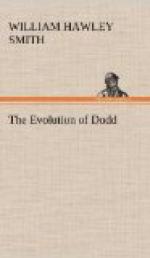The old people lengthened the cords and strengthened the stakes of their simple home, and made the Elder and his wife, and the seven children ("seven devils,” an irreverent sister once called them in a burst of indignation at the state of affairs) as comfortable as possible. To be sure grandpa and grandma Stebbins were old, and it was long since there had been children in the house, but they had enough and to spare in crib and pantry, and they had lived sufficiently long in this world to accept the inevitable without a murmur.
But for all of that, the children were a source of a good deal of annoyance to the old people, especially until they were brought somewhat under subjection by the faithful hand of the old gentleman, who found that he should have to stand up for his own in the premises or submit to the unendurable.
The first real climax occurred on the second day of the quartering of the family thus, and “Dodd” was the boy who brought matters to a focus.
The month was October, and down in the yard, a few feet from the bee-hives, just beyond the shadow of the weeping-willow that stood near the well, and along the row of gooseberry bushes under which the hens were wont to gather and gossip—standing on one leg and making their toilets meanwhile—there stood a barrel, out of whose bung-hole protruded a black bottle turned bottom side up. The barrel was filled with the best cider made that season, a special run from apples that had been sorted out, and from which every worm-hole and specked place had been cut by the thrifty hand of Grandma Stebbins. This was for the family vinegar for the year, and the cask was thus left in the sun duly to ripen its contents.
“Dodd” had not been in the yard five minutes before his quick eye caught sight of this, and his eager imagination transformed it into a horse in a twinkling. He did this the more easily, too, because it was raised from the ground a foot or more, being supported by blocks of wood which in the mind’s eye of the boy did well enough for legs, while a spicket, protruding from one end, below, made a head for the animal, which, though small, was available for bridling purposes.
It was the work of but a minute to jerk a string from his pocket, bridle the beast, and mount him for a ride.
“Dodd” had but fairly started on this escapade, however, when his grandfather appeared in the yard and at once saw the danger that threatened his carefully garnered cider. He quietly approached his little grandson, and, telling him that he could not permit him to play with the barrel, began gently to lift him to the ground.
But against this the boy rebelled. He clutched his little legs about the cask and held to his seat with all his might, and when at last he was forced to yield, he took the black bottle with him as a trophy.
His grandfather set him down and explained to him how the cider was turning to vinegar; that if it was jarred it would spoil it, and how the black bottle “drew the sun.”




